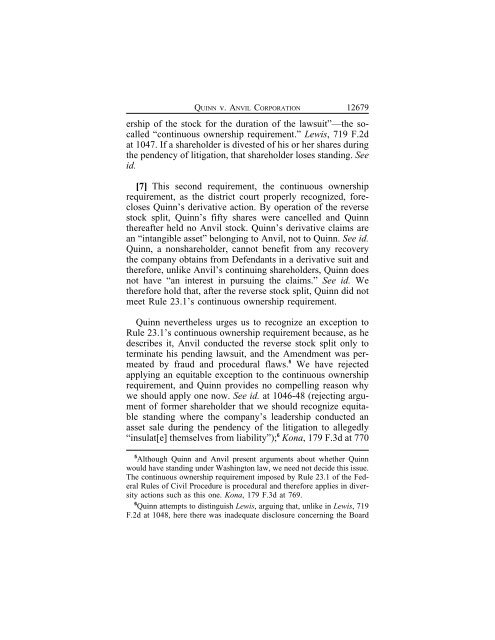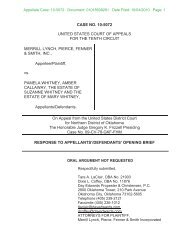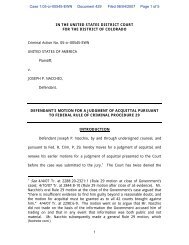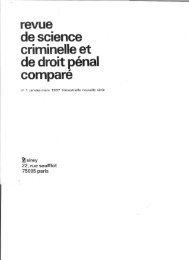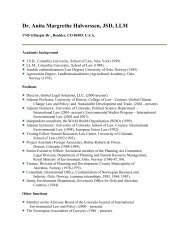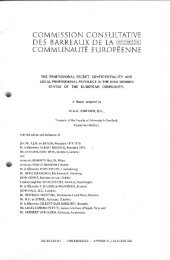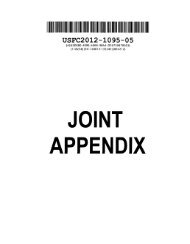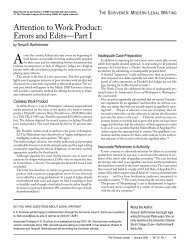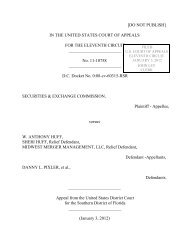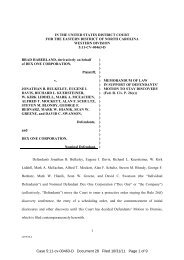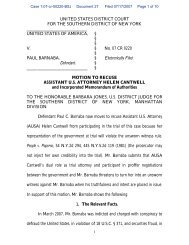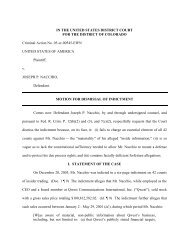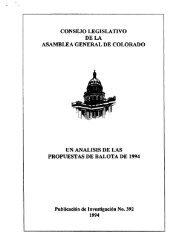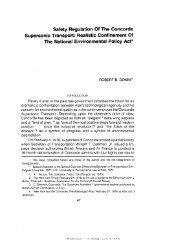Quinn v. Anvil Corp.
Quinn v. Anvil Corp.
Quinn v. Anvil Corp.
Create successful ePaper yourself
Turn your PDF publications into a flip-book with our unique Google optimized e-Paper software.
QUINN v. ANVIL CORPORATION<br />
12679<br />
ership of the stock for the duration of the lawsuit”—the socalled<br />
“continuous ownership requirement.” Lewis, 719 F.2d<br />
at 1047. If a shareholder is divested of his or her shares during<br />
the pendency of litigation, that shareholder loses standing. See<br />
id.<br />
[7] This second requirement, the continuous ownership<br />
requirement, as the district court properly recognized, forecloses<br />
<strong>Quinn</strong>’s derivative action. By operation of the reverse<br />
stock split, <strong>Quinn</strong>’s fifty shares were cancelled and <strong>Quinn</strong><br />
thereafter held no <strong>Anvil</strong> stock. <strong>Quinn</strong>’s derivative claims are<br />
an “intangible asset” belonging to <strong>Anvil</strong>, not to <strong>Quinn</strong>. See id.<br />
<strong>Quinn</strong>, a nonshareholder, cannot benefit from any recovery<br />
the company obtains from Defendants in a derivative suit and<br />
therefore, unlike <strong>Anvil</strong>’s continuing shareholders, <strong>Quinn</strong> does<br />
not have “an interest in pursuing the claims.” See id. We<br />
therefore hold that, after the reverse stock split, <strong>Quinn</strong> did not<br />
meet Rule 23.1’s continuous ownership requirement.<br />
<strong>Quinn</strong> nevertheless urges us to recognize an exception to<br />
Rule 23.1’s continuous ownership requirement because, as he<br />
describes it, <strong>Anvil</strong> conducted the reverse stock split only to<br />
terminate his pending lawsuit, and the Amendment was permeated<br />
by fraud and procedural flaws. 5<br />
We have rejected<br />
applying an equitable exception to the continuous ownership<br />
requirement, and <strong>Quinn</strong> provides no compelling reason why<br />
we should apply one now. See id. at 1046-48 (rejecting argument<br />
of former shareholder that we should recognize equitable<br />
standing where the company’s leadership conducted an<br />
asset sale during the pendency of the litigation to allegedly<br />
“insulat[e] themselves from liability”); 6 Kona, 179 F.3d at 770<br />
5 Although <strong>Quinn</strong> and <strong>Anvil</strong> present arguments about whether <strong>Quinn</strong><br />
would have standing under Washington law, we need not decide this issue.<br />
The continuous ownership requirement imposed by Rule 23.1 of the Federal<br />
Rules of Civil Procedure is procedural and therefore applies in diversity<br />
actions such as this one. Kona, 179 F.3d at 769.<br />
6 <strong>Quinn</strong> attempts to distinguish Lewis, arguing that, unlike in Lewis, 719<br />
F.2d at 1048, here there was inadequate disclosure concerning the Board


